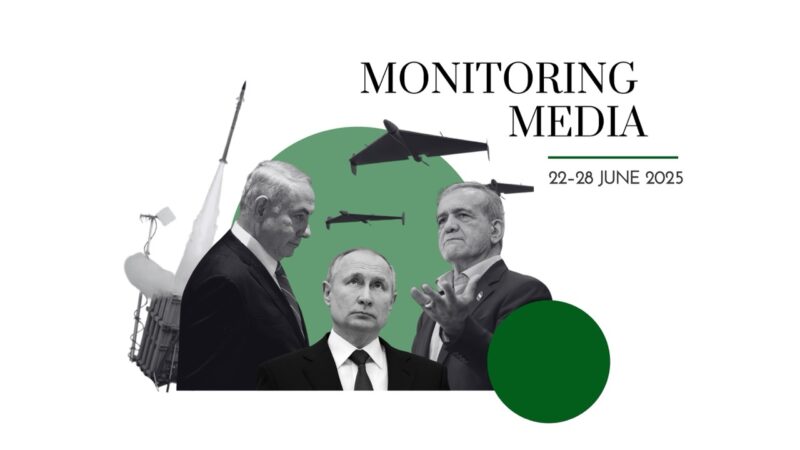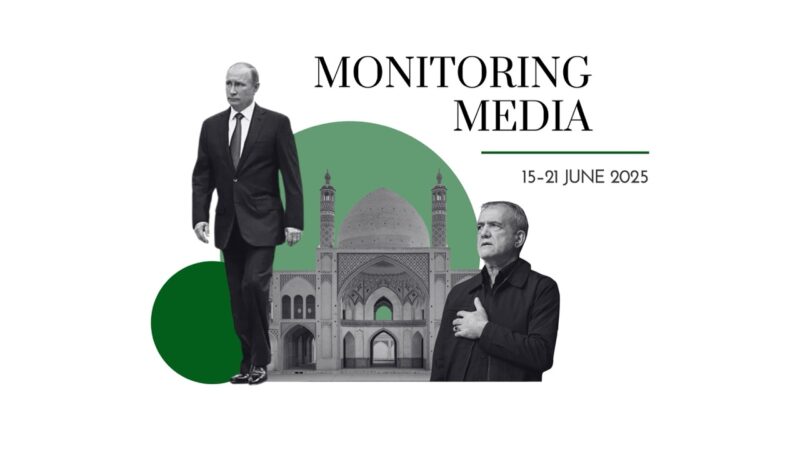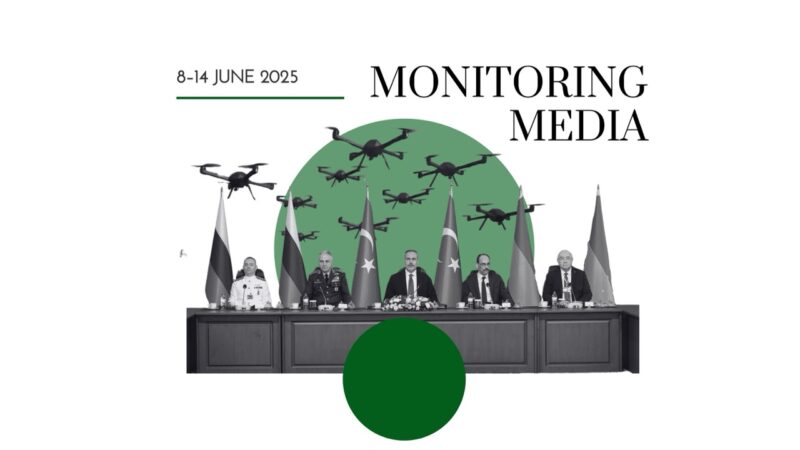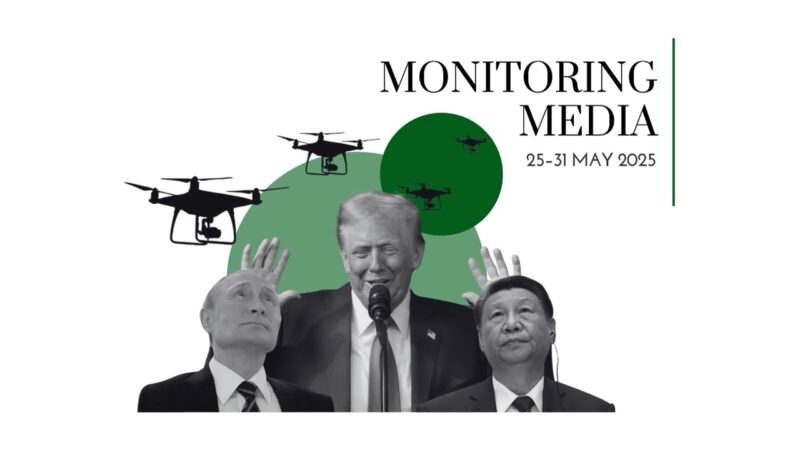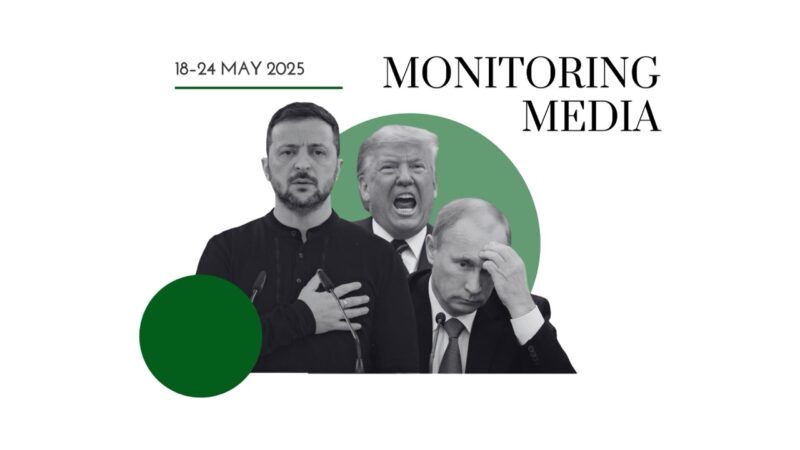Ukraine to receive Western tanks and fighter jets, eventually

CIUS weekly report on media coverage of Ukrainian affairs, 22–28 October 2022
Three publications (Foreign Affairs, Foreign Policy, and Politico) were selected to prepare this report on how the situation in Ukraine has been portrayed in the press during the past week (22–28 October 2022). The sample was compiled based on their impact on public opinion as well as on their professional reputation, popularity among the readership, and topical relevance. These three publications represent centrist viewpoints on the political spectrum.
This report covers only the most-read and relevant articles about Ukraine, as ranked by the respective publications themselves in the past week. Its scope covers promoted articles on home pages and articles from special sections on Ukraine, with the hashtag #Ukraine, from the paper editions of the publications, and about Ukraine from opinion columns and editorials.
Topics featured in the selected articles:
- Ukraine’s current affairs: Ukraine will receive even greater volumes of advanced Western weaponry and equipment in future;
- The world and Ukraine: US is replacing its older nuclear bombs in Europe with advanced ones; some voices in the US Democratic party call for reconciliation with Putin; Washington should never sever all diplomatic connections with the Kremlin; Iran and Saudi Arabia support Russia only because they dislike the West more; the Russo-Ukrainian war resembles the First World War, whose bitter outcomes decision-makers should always keep in mind;
- Russia at war: Putin’s only winning option, albeit a risky one, is to escalate the war; Russia accuses Ukraine of intending to use a “dirty” (radioactive) bomb; Russian elites and oligarchs may abandon their loyalty to Putin if they are stripped of their status.
The most common arguments:
Ukraine serving as the best combat testing field for Western weaponry in decades. Paul McLeary (Politico) writes about the optimistic expectations of Ukraine’s Defence Minister, Oleksii Reznikov, who “is confident that Kyiv will eventually obtain Western tanks and fighter planes to help push Russian forces out of his country, but thinks Washington will have to lead the way before allies will follow.” In particular, the Minister is hoping to receive Abrams main battle tanks, as well as fighter jets like F-16s, F-15s, or Gripen: “if you hear it’s impossible, it means it will be possible in the future.” McLeary highlights that a lot of equipment that was once considered unattainable for Kyiv, such as drones, rockets, and artillery, has eventually reached Ukraine’s army “in a frustrating game of red lines that are later crossed by world governments.” Therefore, as just the first US Abrams appear on Ukraine’s battleground, German Leopards and Marders will likely follow suit. McLeary also writes that by delivering military equipment and weapons to Ukraine, Western states can test their effectiveness in real battle conditions. This particularly applies to air defence systems, Ukraine’s number-one priority weapon (which later might be co-developed and co-produced with Ukraine’s military industries. Also, referring to Reznikov, McLeary argues that “Russia’s nuclear threats and its hammering of civilian targets are being seen as a desperate attempt to make up for its failures on the battlefield.” These threats and hammering will likely grow in scope and number, providing further evidence of Russia being a terrorist state.
US to deliver nuclear bombs to Europe months ahead of schedule. Bryan Bender, Paul McLeary, and Erin Banco (Politico) write that in light of Russia’s recent threats to shell Ukraine with nuclear weapons and concerns that the West is doing too little to deter the Kremlin’s aggression, Washington promised to stockpile its upgraded B61-12 air-dropped gravity bombs in early winter 2022 in the EU instead of spring 2023. The authors argue that “the message behind sending the first bombs in December may be directed more at European allies that feel especially vulnerable to Moscow.” During the recent NATO meeting, 15 alliance members declared that possession of nuclear bombs within their sovereign borders would serve as the best evidence of not giving in to “Putin’s nuclear blackmail.” At this moment, the US has already stockpiled older versions of its B61 bombs in Europe, and their replacement with newer ones has been a long-planned program of which Russia as well as other states in the world should have been aware. However, given the present circumstances of Russia’s losses in Ukraine and Putin’s recent aggressive rhetoric, the planned delivery of the US nuclear bombs to Europe may become a factor of escalation in the Russo-Ukrainian war.
A group of US Democrats calls for peace talks with Russia but immediately rescinds it. Alexander Ward, Andrew Desiderio, Nicholas Wu, and Jordain Carney (Politico) narrate a 24-hour kaleidoscope of events that developed around an open letter from Democratic lawmakers to President Joe Biden on engaging in direct diplomacy with Russia to find a resolution to the war in Ukraine. On Monday 24 October, thirty members of the House of Representatives submitted the letter, while the next day it was withdrawn. By encouraging the Biden administration to establish immediate contact with the Kremlin and seek peaceful solutions, the letter not only downplayed Russia’s war crimes in Ukraine but disregarded Ukraine’s agency; the letter ignored the fact that for months official Kyiv has been speaking out vociferously against negotiating with the current Russian leadership, particularly after having witnessed their crimes and having launched a successful counteroffensive. The authors offer an investigation into how the letter reached the public, discuss its content with their sources in Congress, and draw a picture to clarify the confusion. It appears that the letter was drafted on 1 August, when the war situation was completely different. On 24 October, it was released without proper authorization; at least, many of the Democratic lawmakers who had put their names on it confessed that they had no knowledge about its going public. The timing behind the letter’s release was very poor: thirty Democratic lawmakers used the rhetoric of Ukraine-sceptic Republicans on the eve of decisive elections to the House of Representatives—not to mention that Ukraine’s counteroffensive was on the rise. The letter triggered “ire within the Democratic caucus, where several lawmakers bashed the letter in public in a remarkable display of intraparty rejection.”
The US should not make Russia feel like a besieged fortress in total isolation. Samuel Charap and Miranda Priebe (Foreign Affairs) argue that US decision-makers should not ultimately reject diplomatic means and negotiations with Russia in their effort to force it into ending the invasion. Charap and Priebe criticize the current position of Biden’s administration for its steadfast support of Kyiv “for as long it takes.” This position—backed by an overwhelming majority of Western states—envisages that Russia surrenders and “Kyiv regains all its territory, receives reparations from Moscow, and signs security agreements with Western countries.” While being desirable, such an end to the invasion remains improbable at this time. Charap and Priebe consider that military pressure (and Ukraine has already demonstrated that it can defeat Russia on the battlefield) without appropriate diplomatic groundwork will likely lead to new waves of destruction. Firstly, remaining isolated and being pressed into a corner, Putin may decide to use all weapons at his disposal as he will have nothing to lose. Secondly, if the mobilization in Russia succeeds, Ukraine risks losing its military initiative and being pushed back from previously liberated territories. Thirdly, even if forced to retreat beyond Ukraine’s sovereign borders, Russia may not acknowledge its defeat and could continue shelling its neighbour with long-range weaponry. All these three reasons lead Charap and Priebe to the deduction that Ukraine’s “territorial victory would need to be combined with an agreement to end the war,” as otherwise the war will devolve into an unpredictable protracted conflict with global repercussions. One way for Ukraine to possibly become secure once Russia is defeated on the battlefield would be to remove Putin and his regime from power. However—other than the prosecution of (unspecified) war criminals—regime change as an objective has never been clearly raised by the West or, specifically, by the US. In this light, Charap and Priebe conclude that “the Biden administration should consider keeping all lines of communication with Moscow open, from the president on down, both to signal openness to an eventual negotiated end to the war and to have channels in place to facilitate peace talks when the time is right.”
Iran and Saudi Arabia support Russia in the imposition of a new world order. Ellie Geranmayeh and Cinzia Bianco (Foreign Policy) draw our attention to the fact that two often irreconcilable powers in the Middle East have adopted a similar pro-Russian stance: “Iran is reportedly delivering weapons, namely drones and possibly missiles, to Russia for its use in Ukraine. Saudi Arabia is weaponizing its oil production in ways that help keep Moscow solvent and inflict greater pain across Western capitals ahead of a cold winter.” The reason for such a stance is the desire of both states to weaken what they perceive to be the US’s global hegemony and, consequently, reaffirm their role as important actors in the multipolar post-Western world. Riyadh decided to demonstrate to Washington that its policies, including the ones concerning the oil trade, will no longer be influenced from the outside. Tehran, meanwhile, has decided to strengthen its relations with non-Western powers, above all Russia, to secure options for a lifeline in case of new rounds of sanctions. Geranmayeh and Bianco conclude that “in assessing how to manage regional [Middle Eastern] powers, the United States should shift away from the traditional thinking that it can make a strategic bet on Saudi Arabia or that a containment policy is the solution to all areas of confrontation with Iran. The West needs new, more innovative, and more effective policies to respond to regional powers in the multipolar world order that has been expedited by the clash with Russia.”
iran
Escalation is Putin’s only option on the Ukraine question, but it’s irreversible. Peter Clement (Foreign Affairs) focuses his article on understanding President Putin’s risk calculus: “Although many questions remain about how far [Putin] is now prepared to go, an examination of how his thinking has evolved helps explain why he has taken this course and what he may decide are his most plausible options in the coming weeks and months.” Clement highlights that Putin’s sabre rattling started a few years prior to the invasion of Ukraine, in 2018, when his public addresses conveyed a “strong sense of confidence in Russia’s ability to successfully counter any adversary.” Speaking of the invasion specifically, Clement suggests that Putin’s risk calculus was grounded on three pillars: “Russian security interests, a perceived window to advance broader geostrategic goals, and a desire to secure his place in Russian history.” The first pillar was about curtailing Ukraine’s desire to join the EU and (hypothetically) NATO. The second pillar was about maximizing gains from the post-COVID fatigue, frictions within, and leadership crises in the Western world. The third pillar was about Putin’s legacy in Russia’s history, to which his essay On the Historical Unity of the Russians and Ukrainians became a major building block. Clement concludes that Putin cannot stop waging this war: “He who rides a tiger is afraid to dismount.” Therefore, if shortages of gas and oil during winter months will not prevent the West from funding and arming Ukraine, he may resort to cyber-attacks on Western critical infrastructure, as well as deploying chemical or nuclear weapons on the battlefield.
Russia tries to accuse Ukraine of nuclear escalation. Lara Seligman (Politico) starts with the fact that Russian Defense Minister Sergei Shoigu made a series of phone calls to his counterparts in the US, France, the UK, and Turkey and warned them about Ukraine’s intention of detonating a radioactive “dirty bomb” on its own territory. However, Western officials rejected such claims and generally regarded them as false accusations designed to escalate the war. Moreover, as Seligman highlights, “some U.S. officials are concerned that Moscow could deploy a dirty bomb itself, a weapon improvised from radioactive nuclear waste material and conventional explosives, and then blame Ukraine for it.” Apart from Shoigu, Russia’s chief of general staff Gen. Valery Gerasimov and head of Radiation, Chemical, and Biological Defense Forces Lt.-Gen. Igor Kirillov also warned Western officials and the general public about the “dirty bomb” threat, through phone calls and media addresses.
Russian elites and oligarchs may be afraid of losing their status more than they are afraid of Putin. Alexander Cooley and Brooke Harrington (Foreign Affairs) open their article with a statement that “unlike traditional economic or political sanctions, which seek to coerce or punish governments and thus change their conduct, status-based sanctions are designed to destabilize rogue regimes by fragmenting the interests of elites.” In other words, the financial losses which Russian oligarchs and elites are suffering because of the West’s response to the war have not considerably changed their inclination to support Putin’s regime, although they are uneasy about becoming stuck in a pariah state. The whole idea behind attacking their status is not as much about humiliating influential people as it is about depriving them of important commodities and resources, “such as relationships, positions, and information.” The status-based sanctions also make “associating with [the targeted people] too costly for others.” The first Russian oligarchs, such as billionaire bankers Oleg Tinkov and Mikhail Fridman, have already recoiled from the regime and started speaking against Putin. They called his invasion a “crazy war” and a “tragedy.” Cooley and Harrington conclude that following the eighth month of the war, “domestic and international elites continue to distance themselves from a regime [Putin’s] that is increasingly isolated and in apparent disarray.” In their turn, the autocratic leaders of other states are closely observing how things will turn out for Russia, its elites, and its President.
Worth your attention:
The responsibility for Russia’s invasion of Ukraine does not lie with the West. Anatol Lieven (Foreign Policy) writes that “today we can all agree that principal responsibility for the war in Ukraine lies with the Russian government, which invaded Ukraine. But will historians of the future attribute sole responsibility to Russia and exonerate the U.S. and NATO member governments of all blame for trying to integrate Ukraine with the West, and thus threatening what both Russians and a long row of Western experts . . . warned were seen in Moscow as vital Russian interests?”
Lieven makes the unambiguous statement that “the U.S. and NATO [wanted] to integrate Ukraine with the West, and thus [threatened] vital Russian interests.” This statement has one weak point to it.
Lieven suggests that NATO and the US courted Ukraine, providing the casus belli for Russia. However, the Alliance has never aimed to threaten Russia; quite the opposite, it actually developed a special institutional framework of cooperation for the federation, and in the early 1990s Russia even considered joining NATO. Therefore, apart from serving as a convenient target for the Kremlin’s propaganda, NATO’s “cooperation” with Ukraine can hardly be defined as a major threat justifying the invasion. For more details, we suggest an article by Hans Petter Midttun (Euromaidan Press).
Lieven suggests that Washington pushed Ukraine toward the path of democratization and Euro-Atlantic integration. Following the logic of this suggestion, it was not Ukraine that decided to leave the Russian sphere of geopolitical influence but the US that pulled the sovereign state out of its supposedly rightful place of belonging. This suggestion of Lieven’s is much in line with the Kremlin’s current rhetoric, which denies Ukraine the right of agency in international relations.
Many of Lieven’s arguments are also challenged in articles by Leif Wenar (The Wall Street Journal) and Nicolas Tenzer (The Conversation).
Russian atrocities in Ukraine should not be called “genocide” but “war crimes.” Anatol Lieven (Foreign Policy) writes that “the Russian invasion of Ukraine and the forced annexation of Ukrainian territory are both clearly very serious crimes under international law, for which I hope that President Vladimir Putin will one day be brought to account . . . However, we should be very careful not to portray these crimes as in some way culturally special to Russians, or as ‘genocide,’ if only for the very obvious reason that Western forces have themselves repeatedly carried out similar actions.”
The fact is that there exists a plethora of evidence of genocide that is overlooked by Lieven: public addresses of Kremlin spokespersons, articles in media affiliated with the Kremlin, even Putin’s essay alleging the unity of Russian and Ukrainian nations.
The whole idea of “de-nazification” (that provided one of the casus belli for the Russian invasion) entails in the dehumanization and subsequent physical extermination of the “imaginary Nazi” regardless of their language, religious, and cultural backgrounds.
The paradox is that even the Russian-speaking people with Ukrainian passports are indiscriminately killed, regardless of the fact that the Russian invasion advocated the protection of Russian-speakers against “the Nazis.”
Moreover, Ukrainian children are being forcibly taken from their homes to the Russian interior for illegal adoption and re-education. In occupied territories Russians segregate the remaining Ukrainians in filtration camps.
Lieven may be right that the Russians are inflicting damage on Ukrainian civilians similar to what British and US troops inflicted in Korea, Vietnam, and Syria. However, the indiscriminate killing by Russians of civilian Ukrainians looks more like the atrocities committed by Hitler’s SS or the Rwandan Hutu militias.
